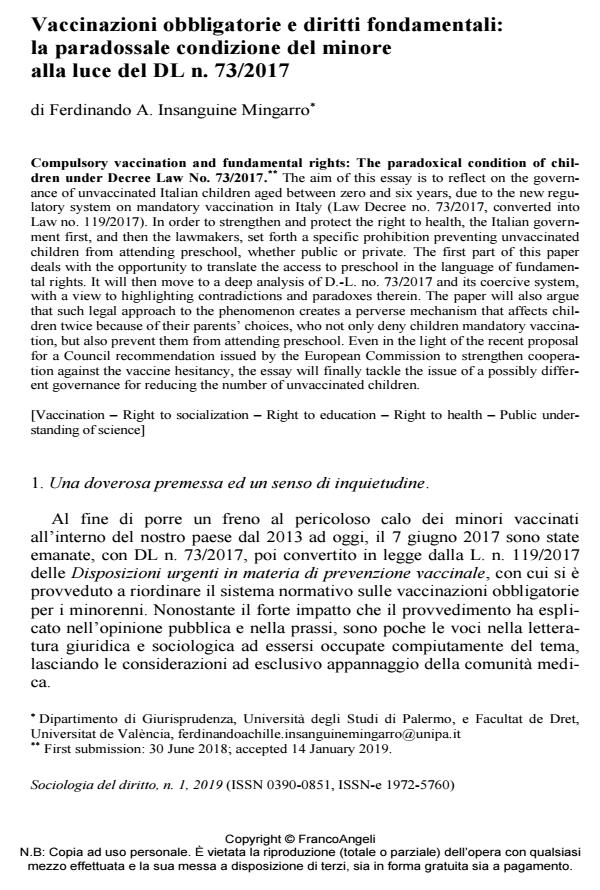Compulsory vaccination and fundamental rights: The paradoxical condition of children under Decree Law No. 73/2017
Journal title SOCIOLOGIA DEL DIRITTO
Author/s Ferdinando A. Insanguine Mingarro
Publishing Year 2019 Issue 2019/1 Language Italian
Pages 15 P. 165-179 File size 348 KB
DOI 10.3280/SD2019-001007
DOI is like a bar code for intellectual property: to have more infomation
click here
Below, you can see the article first page
If you want to buy this article in PDF format, you can do it, following the instructions to buy download credits

FrancoAngeli is member of Publishers International Linking Association, Inc (PILA), a not-for-profit association which run the CrossRef service enabling links to and from online scholarly content.
The aim of this essay is to reflect on the governance of unvaccinated Italian children aged between zero and six years, due to the new regulatory system on mandatory vaccination in Italy (Law Decree no. 73/2017, converted into Law no. 119/2017). In order to strengthen and protect the right to health, the Italian government first, and then the lawmakers, set forth a specific prohibition preventing unvaccinated children from attending preschool, whether public or private. The first part of this paper deals with the opportunity to translate the access to preschool in the language of fundamental rights. It will then move to a deep analysis of D.-L. no. 73/2017 and its coercive system, with a view to highlighting contradictions and paradoxes therein. The paper will also argue that such legal approach to the phenomenon creates a perverse mechanism that affects children twice because of their parents’ choices, who not only deny children mandatory vaccination, but also prevent them from attending preschool. Even in the light of the recent proposal for a Council recommendation issued by the European Commission to strengthen cooperation against the vaccine hesitancy, the essay will finally tackle the issue of a possibly different governance for reducing the number of unvaccinated children.
Keywords: [Vaccination - Right to socialization - Right to education - Right to health - Public understanding of science]
- Bobbio, Norberto, 1977. Dalla struttura alla funzione. Nuovi studi di teoria del diritto. Milano: Comunità.
- Boudon, Raymond, 1981. Effetti “perversi” dell’azione sociale. Milano: Feltrinelli.
- Burioni, Roberto, 2017. La congiura dei somari. Perché la scienza non può essere democratica. Milano: Rizzoli.
- Caudill, David S., 2011. Stories about Science in Law: Literary and Historical Images of Acquired Expertise. London: Routledge.
- Commissione Europea, 2018a. Council Recommendation on Strengthened Cooperation against Vaccine Preventable Diseases. Factual Report of the Online Public Consultation, -- https://ec.europa.eu/health/sites/health/files/vaccination/docs/2017-2018_consultation_factual_en.pdf (visitato il 6 giugno 2018).
- Commissione Europea, 2018b. COM(2018) 244/2 2018/0115 (NLE), Proposal for a Council Recommendation on Strengthened Cooperation against Vaccine Preventable Diseases.
- Donati, Pierpaolo, & Ivo Colozzi (a cura di), 2006. Capitale sociale delle famiglie e processi di socializzazione. Un confronto fra scuole statali e di privato sociale. Milano: FrancoAngeli.
- Elliman, David, & Helen Bedford, 2013. Should the UK Introduce Compulsory Vaccination? The Lancet, 381, 9876: 1434-1436. DOI: 10.1016/S0140-6736(13)60907-1
- Ferrajoli, Luigi, 2007. Principia Juris. 2 voll. Roma-Bari: Laterza.
- Fine, Paul E.M., 1993. Herd Immunity: History, Theory and Practice. Epidemiologic Reviews, 15, 2: 265-302.
- Fine-Goulden, Miriam, 2010. Should Vaccination Be Compulsory in the UK? Opticon1826, 8: 4-9.
- Hollander, Rachelle, 1991. Expert Claims and Social Decisions: Science, Politics and Responsibility. In Deborah G. Mayo & Rachelle Hollander (a cura di), Acceptable Evidence: Science and Values in Risk Management. Oxford: Oxford University Press.
- Lessig, Lawrence, 1998. The New Chicago School. The Journal of Legal Studies, 27, 2: 661-691. DOI: 10.1086/468039
- Merton, Robert K., 1973. The Sociology of Science: Theoretical and Empirical Investigations. Chicago: The University of Chicago Press.
- Miller, Arthur, 1950. An Enemy of the People: An Adaptation of the Play by Henrik Ibsen. New York: Penguin Books.
- Močinić, Snježana, & Cristina Moscarda, 2016. L’ambiente come fattore di apprendimento nella scuola dell’infanzia. Studia Polensia, 5, 1: 1-21.
- Reynolds, A.J. et. al., 2001. Long-term Effects of an Early Childhood Intervention on Educational Achievement and Juvenil Arrest. A 15-Year Follow-up of Low-income Children in Public Schools. JAMA, 285, 18: 2339-2346.
- Ryan, James E., 2006. A Constitutional Right to Preschool. California Law Review, 94, 1: 49-99. DOI: 10.15779/Z38CM5Q
- SAGE Working Group on Vaccine Hesitancy, WHO, 2014. Report on Vaccine Hesitancy.
- Skibbe, Lori E. et al., 2013. Relative Contributions of Pre-Kindergarten and Kindergarten to Children’s Literacy and Mathematics Skills. Early Education and Development, 24, 5: 687-703. DOI: 10.1080/10409289.2012.712888
- Sobre la obligatoriedad de las vacunas en tiempos de covid-19: aproximación contextual y análisis desde el Derecho y las políticas comparadas Vicente Bellver Capella, Federico De Montalvo Jääskeläinen, in Relaciones Internacionales /2023 pp.153
DOI: 10.15366/relacionesinternacionales2023.52.008 - Análisis de la maternidad subrogada como nueva tecnología en el ámbito biomédico y jurídico-filosófico: avance técnico, retroceso humano Jorge Castellanos Claramunt, in Revista sobre la infancia y la adolescencia /2019 pp.62
DOI: 10.4995/reinad.2019.11933
Ferdinando A. Insanguine Mingarro, Vaccinazioni obbligatorie e diritti fondamentali: la paradossale condizione del minore alla luce del DL n. 73/2017 in "SOCIOLOGIA DEL DIRITTO " 1/2019, pp 165-179, DOI: 10.3280/SD2019-001007